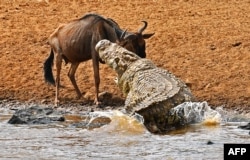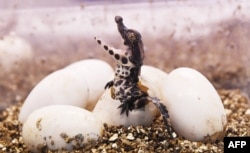Now, the VOA Learning English program Words and Their Stories.
Today we talk about an amazing animal and an expression it has given us. The crocodile!
First, why are they amazing?
Well, crocodiles are experts at survival. Scientists say they first appeared 200 million years ago and have outlived the dinosaurs by some 65 million years. One reason they are such good survivors is that they can go for a very long time without eating.
And they are expert hunters! They use their strong jaws to bite their prey and then they swallow their food whole.
Here’s another fun fact about crocodiles: When they lose a tooth they grow one right back. A crocodile can go through 8,000 teeth in one lifetime!
Okay, while these facts are fascinating, they really do not help to explain today’s expression: crocodile tears.
Simply put, “crocodile tears” are fake sadness. You pretend to cry and feel badly for something when in fact … you could not care less. A great word to describe crocodile tears is insincere.
But don’t take my word for it. Let’s hear country-western singer Dale Watson sing his song “Crocodile Tears.”
Crocodile tears, they’re tearing me apart.
I know they’re not sincere, still they break my heart.
But why do tears from an ancient, unfeeling reptile mean false sadness?
Well, the expression “crocodile tears” comes from an old myth that crocodiles would shed tears while eating their prey.
Writers on the website Crocodilian.com claim that this myth was in use by the 1200s. A religious worker from that time wrote that if a crocodile found a man by the water, it would kill him if it could. Then the crocodile would cry tears on the man, but then finally – swallow him.
Another myth about crocodile tears suggests the animals are very crafty indeed. Crocodiles, the story goes, would cry tears as a false show of guilt or grief to trick their prey. The prey would come closer and then become dinner.
Of course, we know now that these stories are not true. Scientists explain that crocodiles DO create tears. The fluid helps to clean its eyes. But crocodiles do not cry. Crying is purely emotional and is reserved for us humans.
So, that is the origin of the phrase “crocodile tears.” Now, let’s talk about how and when to use it.
This is a common expression and we use it in any situation. So, I could say it to my best friend as easily as I could to colleagues at work.
But, please note. You do not have to have actual tears flowing down your face to have “crocodile tears.” If you fake sadness or regret by using only words, others can still accuse you of having “crocodile tears.”
One last note about this expression: Sometimes, crocodile tears are worse than insincere. Sometimes they are also hypocritical. Those are the times you are showing sadness but actually in your heart, you are quite happy about the situation.
And that’s all the time we have for Words and Their Stories.
Until next time … I’m Anna Matteo!
Those crocodile tears ain't gonna work this time on me
I know that a girl's supposed to cry but not over me…
Anna Matteo wrote this story for VOA Learning English. Kelly Jean Kelly was the editor. The song at the end is Garth Taylor singing “Crocodile Tears.”
Do you have any crocodile expressions in your language? Do they mean the same thing as “crocodile tears”? Let us know in the Comments Section.
_________________________________________________________________
Words in This Story
fake – adj. not true or real
pretend – v. to give a false appearance of being, possessing, or performing
insincere – adj. not expressing or showing true feelings : not sincere
myth – n. a story that was told in an ancient culture to explain a practice, belief, or natural occurrence
shed – v. to pour forth in drops
crafty – adj. clever in usually a deceptive or dishonest way
prey – n. an animal taken by a predator as food
faucet – n. a device that is used to control the flow of water from a pipe
regret – n. a feeling of sadness or disappointment about something that you did or did not do
hypocritical – adj. characterized by behavior that contradicts what one claims to believe or feel









